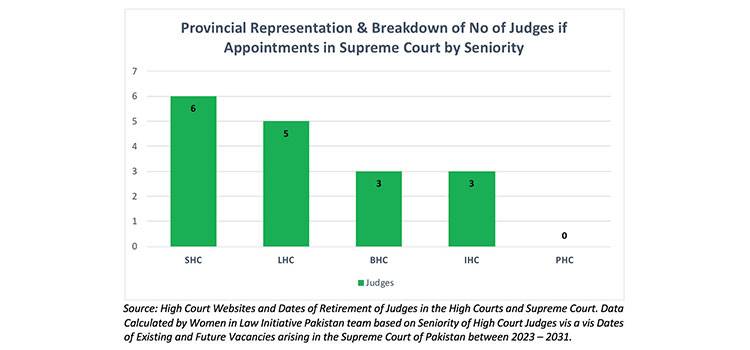
Women In Law has found that Sindh stands to have the highest number of judges 'elevated' if seniority is applied whereas KP will have 0 representation at all between 2023-2031 if seniority is followed.
Interestingly, Honorable J Qazi Faez Isa put forth Justice Mussarat Hillali's name to be proposed for appointment against the existing vacancies which is in lieu of seniority principle in strict sense of the term. If this happens, KP won't just have representation in SC for next 3 years but, number of women in SC will also increase from 1 to 2 and then with Justice Aalia Neelum's 'elevation' on basis of seniority in 2026, the number will increase to 3 women in SC by 2026 till Justice Hillali retires on August 7th 2026.
Upon Justice Hillali's retirement at age of 65 (if she is elevated now) there will again be only 2 women in SC till 2028. After 2026 the next appointment of a female too will become much delayed and uncertain as the 3 of remaining 4 females judges (who won't get elevated on basis of seniority between 2023-2031) in the HC are set to retire by 2024 whereas only 1 is set to retire in 2038. Some 21 male judges will be senior prior to that 1 female so it is unlikely she too will have the chance of being ‘elevated’ to the Supreme Court.
As the data shows however, if seniority is strictly applied Khyber Pakhtunkhwa will have NO representation for the next 8 years at least i.e. till 2031. Seniority is therefore, anti-representation particularly for some provinces. If appointments process is not reformed with a gender and inclusion lens, or worse, if seniority is entrenched, then this is what is the likely outlook and prospects of the court's composition.
Interestingly, Honorable J Qazi Faez Isa put forth Justice Mussarat Hillali's name to be proposed for appointment against the existing vacancies which is in lieu of seniority principle in strict sense of the term. If this happens, KP won't just have representation in SC for next 3 years but, number of women in SC will also increase from 1 to 2 and then with Justice Aalia Neelum's 'elevation' on basis of seniority in 2026, the number will increase to 3 women in SC by 2026 till Justice Hillali retires on August 7th 2026.
Upon Justice Hillali's retirement at age of 65 (if she is elevated now) there will again be only 2 women in SC till 2028. After 2026 the next appointment of a female too will become much delayed and uncertain as the 3 of remaining 4 females judges (who won't get elevated on basis of seniority between 2023-2031) in the HC are set to retire by 2024 whereas only 1 is set to retire in 2038. Some 21 male judges will be senior prior to that 1 female so it is unlikely she too will have the chance of being ‘elevated’ to the Supreme Court.
As the data shows however, if seniority is strictly applied Khyber Pakhtunkhwa will have NO representation for the next 8 years at least i.e. till 2031. Seniority is therefore, anti-representation particularly for some provinces. If appointments process is not reformed with a gender and inclusion lens, or worse, if seniority is entrenched, then this is what is the likely outlook and prospects of the court's composition.

